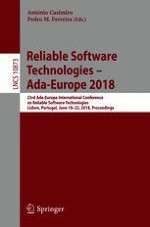2018 | Buch
Reliable Software Technologies – Ada-Europe 2018
23rd Ada-Europe International Conference on Reliable Software Technologies, Lisbon, Portugal, June 18-22, 2018, Proceedings
herausgegeben von: António Casimiro, Pedro M. Ferreira
Verlag: Springer International Publishing
Buchreihe : Lecture Notes in Computer Science
